Get Your Copilot

Create Chatbot For Accounting
Transform your accounting experience with Copilot.Live cutting-edge chatbot. Streamline financial management, automate tasks, and elevate productivity effortlessly. Join the future of accounting today.
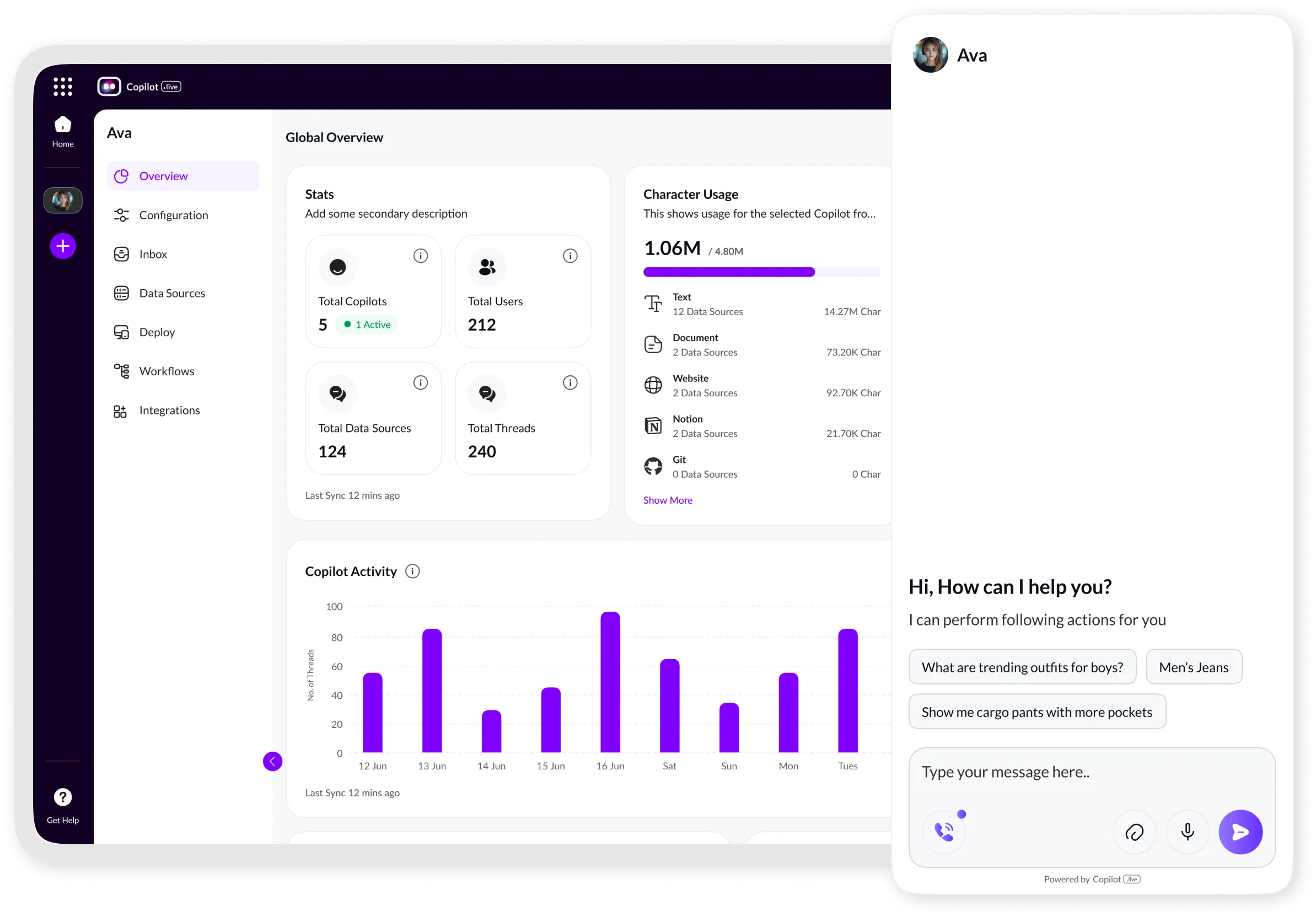
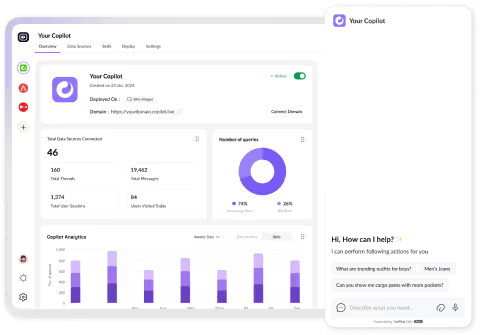
Create Chatbot For Accounting
Transform your accounting experience with Copilot.Live cutting-edge chatbot. Streamline financial management, automate tasks, and elevate productivity effortlessly. Join the future of accounting today.


Build an AI assistant in 3 minutes
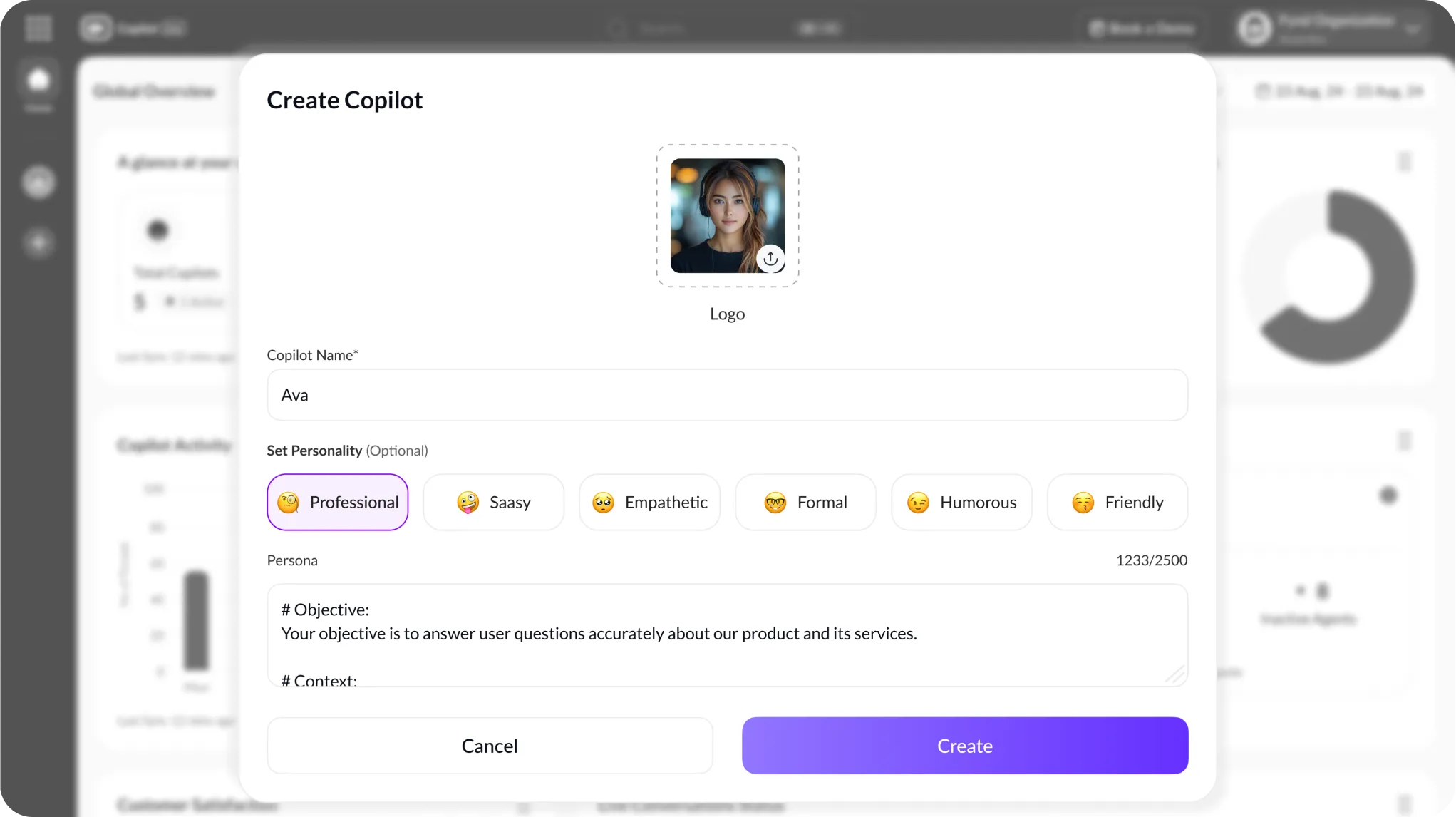
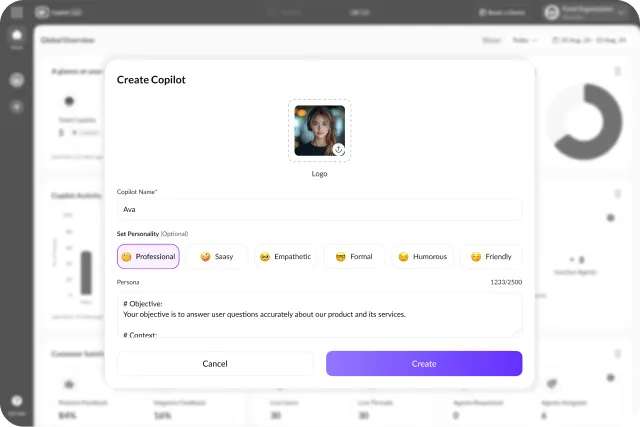
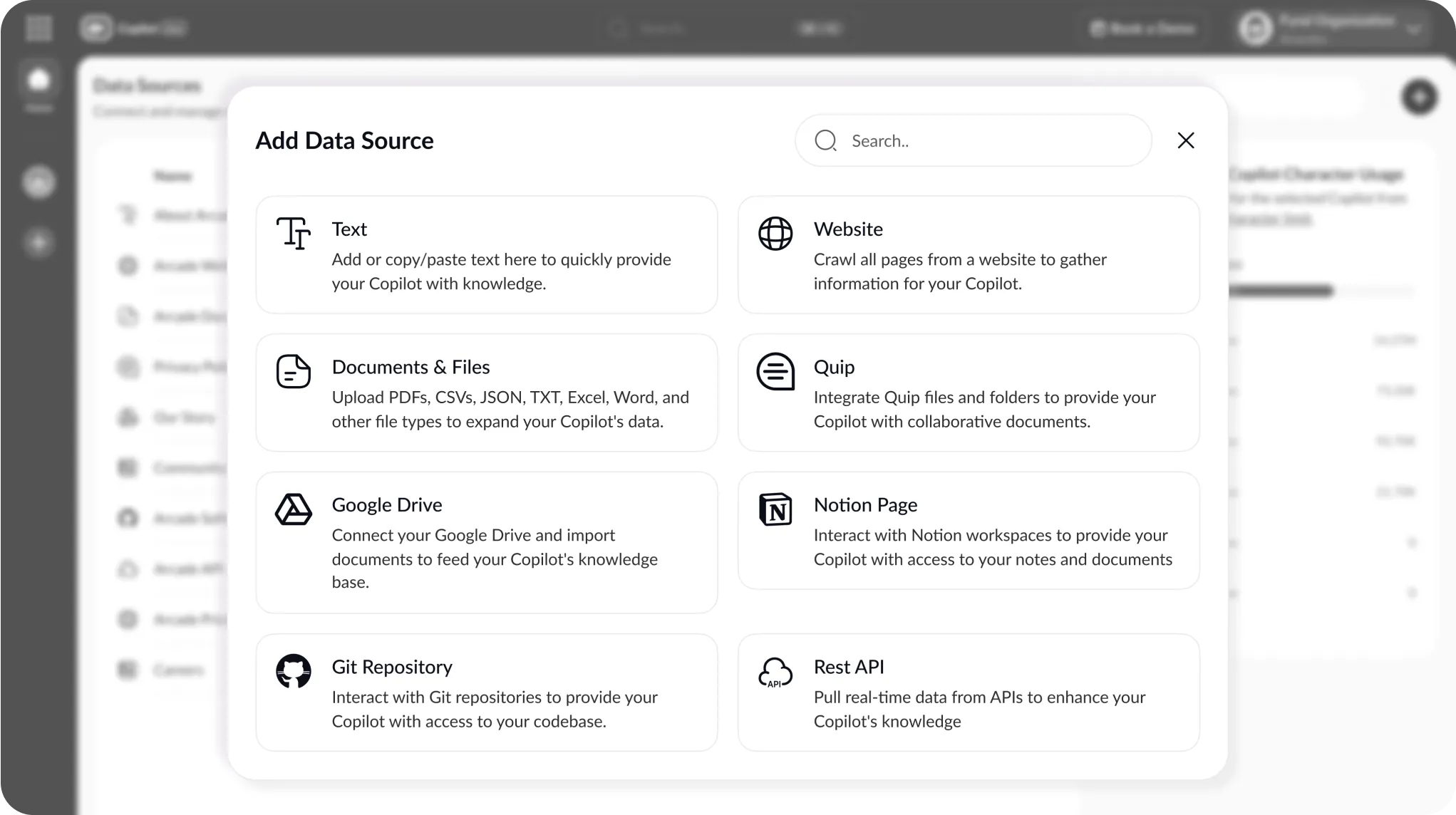
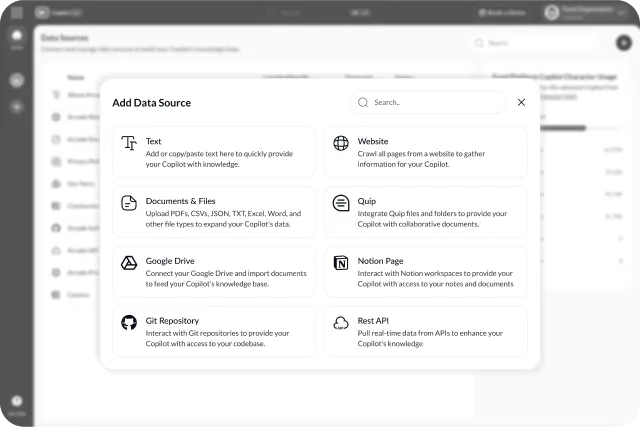
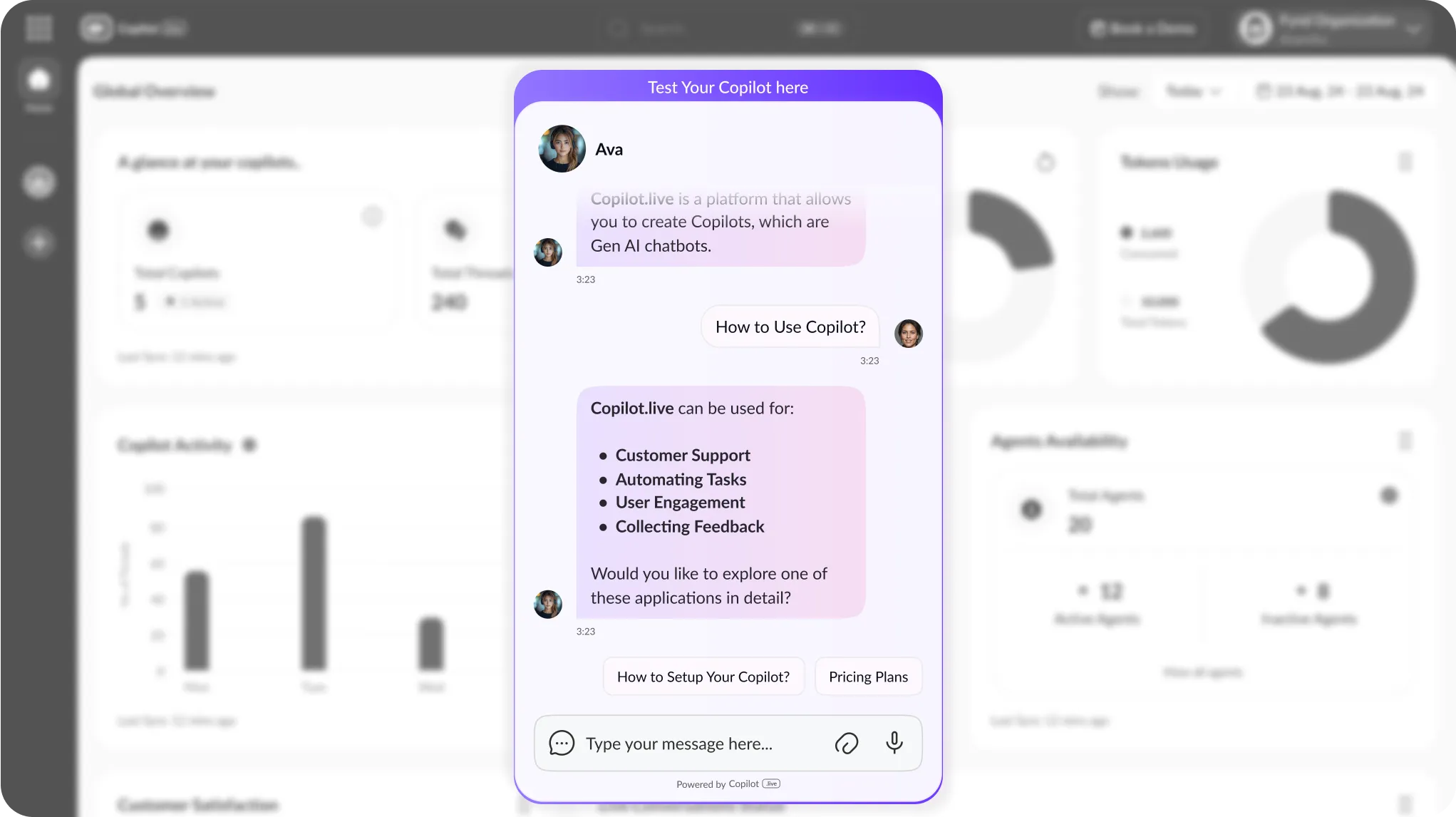
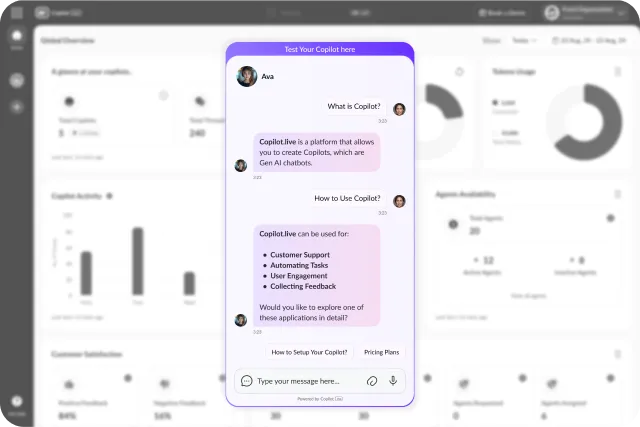
Effortless Chatbot Creation With Copilot.Live
Sign Up
Begin by signing up for Copilot.Live platform. Provide basic information and create an account to access the chatbot creation tools.
Design
Design your chatbot by defining its purpose, setting up conversation flows, and customizing its appearance to match your brand identity.
Integration
Integrate your chatbot seamlessly into your website or preferred community channels. Copilot.Live offers easy integration options for hassle-free deployment.
Testing And Optimization
Test your chatbot thoroughly to ensure it functions flawlessly. Optimize its performance by analyzing user interactions and adjusting to enhance its effectiveness in meeting your objectives


Empower Your Accounting With Copilot.Live Today
Step into the future of accounting automation with Copilot.Live Bid farewell to manual data entry and tedious financial management tasks as you embrace streamlined efficiency and productivity. Our innovative chatbot platform puts you in control, allowing you to craft bespoke AI assistants tailored precisely to your accounting needs. Copilot.Live revolutionizes your financial processes by automating repetitive tasks, providing instant customer support, and delivering invaluable insights into your financial data.
Whether you're a small business owner, a freelancer, or a seasoned accountant, our platform offers the tools and flexibility you need to thrive in today's dynamic digital landscape. Join thousands of satisfied users who have revolutionized their accounting processes with Copilot.Live. Leap AI-driven accounting today and unlock endless possibilities for your business
Why Choose Copilot.Live For Your Accounting Chatbot Needs?
Advanced Analytics
Our advanced analytics feature gives deep insights into user interactions, conversation trends, and performance metrics. Understand user behavior, identify opportunities for improvement, and make data-driven decisions to optimize your chatbot's effectiveness.
Automated Expense Tracking
This feature enables the chatbot to automatically track and categorize expenses based on user inputs or synced bank transactions. It simplifies accounting processes by reducing manual data entry, ensuring accurate financial records, and facilitating timely reporting for businesses or individuals.
Secure Data Encryption
Protects sensitive financial information with robust data encryption technology. Copilot.Live prioritizes data security, ensuring that all communication between users and the chatbot is encrypted to safeguard against unauthorized access and maintain confidentiality.
Natural Language Understanding
Enhance user experience with advanced natural language understanding capabilities. Our chatbot leverages cutting-edge NLP technology to interpret user queries accurately, understand context, and provide relevant responses, enabling seamless communication and empowering users to accomplish tasks effortlessly.


Revolutionize Your Accounting Workflow
Unlock the potential of AI-driven accounting with Copilot.Live Welcome to a new era of financial management where automation, efficiency, and innovation converge to streamline your accounting workflow like never before. Our cutting-edge chatbot solutions empower businesses of all sizes to simplify complex accounting tasks, automate repetitive processes, and enhance customer service with ease.
Say goodbye to manual data entry and tedious paperwork and hello to intelligent automation that saves you time, reduces errors, and boosts productivity with Copilot.Live, you can create custom chatbots tailored to your specific accounting needs whether invoicing, expense tracking, or client management. Join the ranks of forward-thinking businesses embracing AI technology to revolutionize their accounting practices and stay ahead of the curve. Explore the power of Copilot.Live chatbot solutions today and take your accounting workflow to the next level.
Key Features & Benefits Of Copilot.Live Chatbot For Accounting
Discover the next generation of accounting solutions with Copilot.Live cutting-edge chatbot platform. Streamline your financial processes, enhance productivity, and elevate your business to new heights with our intuitive and customizable AI-powered tools. Experience efficiency and accuracy like never before in your accounting operations.
Comprehensive Reporting
Gain valuable insights into your accounting processes with comprehensive reporting capabilities. Track key metrics, monitor performance trends, and generate detailed reports to inform strategic decision-making and optimize financial operations for greater efficiency and effectiveness.
Multi-Language Support
Reach a global audience with multi-language support for your chatbot. Break down language barriers and provide personalized support to users in their preferred language, enhancing accessibility and improving customer satisfaction across diverse demographics and geographic regions.
Customizable User Interface
Tailor the user interface of your chatbot to match your brand identity and user preferences. Customize colors, fonts, and layouts to create a seamless and immersive user experience that reflects your brand personality and resonates with your target audience.
Seamless Integration With CRM Systems
Integrate your chatbot seamlessly with customer relationship management (CRM) systems like Salesforce or HubSpot. Sync customer data, automate lead generation and follow-up processes, and enhance customer engagement across all touchpoints for a unified and cohesive experience.
Launch Your AI-Powered Chatbot For Accounting In No Time
Task Automation
Task automation in accounting involves leveraging technology to streamline repetitive processes, reducing manual intervention and human error. By implementing automation, routine tasks such as data entry, invoice processing, and report generation can be performed efficiently and accurately. Automation software utilizes algorithms and predefined rules to execute tasks automatically, freeing up valuable time for accounting professionals to focus on higher-value activities like financial analysis and strategic decision-making. This improves productivity and efficiency within the accounting department and enhances overall business performance by enabling faster turnaround times and improved accuracy in financial reporting.
Interactive Dashboards
Interactive dashboards in accounting provide dynamic and visually engaging interfaces that allow users to interact with data in real time. These dashboards typically feature customizable widgets, charts, and graphs that display critical financial metrics and performance indicators. Users can drill down into specific data points, apply filters, and explore trends to gain deeper insights into their financial data. Additionally, interactive dashboards often support interactive elements such as clickable buttons and sliders, enabling users to manipulate data and customize their views according to their needs. By facilitating intuitive data exploration and analysis, interactive dashboards empower accounting professionals to make informed decisions and drive business success.
Secure File Sharing
Secure file sharing in accounting refers to exchanging sensitive financial documents and information in a protected and confidential manner. This typically involves using encrypted file transfer protocols and secure cloud storage solutions to ensure that files are transmitted and stored securely. Additionally, secure file-sharing platforms often incorporate access controls, authentication mechanisms, and audit trails to monitor and track file access, ensuring that only authorized users can view and modify documents. By implementing secure file-sharing practices, accounting firms can safeguard sensitive financial data from unauthorized access, mitigate the risk of data breaches, and maintain compliance with industry regulations such as GDPR and HIPAA.
Multi-Currency Support
Multi-currency support in accounting software enables businesses to manage financial transactions and reporting in multiple currencies. This feature allows users to accurately input, track, and reconcile transactions denominated in different currencies. It typically includes functionalities such as automatic currency conversion, real-time exchange rate updates, and the ability to generate financial reports in various currencies. Multi-currency support is essential for businesses operating in global markets or dealing with international clients and suppliers, as it ensures accurate financial record-keeping and enables better decision-making based on comprehensive financial insights. By providing flexibility and accuracy in currency management, multi-currency support helps businesses navigate complex international transactions and maintain compliance with accounting standards across different jurisdictions.
Automatic Reminders
Automatic reminders in accounting software are automated notifications sent to users to prompt them about upcoming tasks, deadlines, or events related to financial activities. These reminders can be set for various purposes, such as invoice due dates, bill payments, tax filing deadlines, or employee payroll processing. By automating reminders, accounting software ensures that essential tasks are noticed and remembered, helping businesses stay organized and on top of their financial obligations. Additionally, automatic reminders save time and effort for accounting professionals by eliminating the need for manual tracking and follow-up, improving efficiency, and reducing the risk of missed deadlines or late payments. Automatic reminders contribute to better financial management practices, improved cash flow management, and enhanced compliance with regulatory requirements.
Client Portal Integration
Client portal integration in accounting software allows businesses to provide their clients with secure access to relevant financial information, documents, and communication channels. This feature enables clients to log in to a centralized platform where they can view and download statements, invoices, and reports and communicate with their accounting firm or financial advisor. Client portal integration enhances collaboration and transparency between businesses and their clients, as it streamlines communication and document-sharing processes, reduces the need for email exchanges and manual paperwork, and improves overall client satisfaction. Additionally, client portal integration often includes customizable branding options, ensuring a seamless and professional user experience that reflects the business's brand identity. Overall, client portal integration fosters stronger client relationships, improves efficiency, and enhances the overall client experience in accounting practices.
Smart Expense Tracking
Intelligent expense tracking in accounting software utilizes artificial intelligence and automation to streamline the process of recording and categorizing expenses. This feature automatically captures and categorizes expenses from receipts, invoices, and bank transactions, eliminating the need for manual data entry. Using machine learning algorithms, smart expense tracking can recognize patterns, assign appropriate categories, and reconcile expenses with corresponding transactions in real time. Additionally, it can flag potential errors or discrepancies for review, ensuring accuracy in financial records. By leveraging smart expense tracking, businesses can save time, reduce administrative overhead, and gain better insights into their spending patterns, enabling more informed decision-making and efficient budget management.
Predictive Analytics
Predictive analytics in accounting software involves using historical financial data and statistical algorithms to forecast future trends, outcomes, and behaviors. This feature analyzes patterns, correlations, and trends within financial data to predict future events, such as revenue projections, cash flow forecasts, and expense trends. By leveraging predictive analytics, businesses can anticipate potential risks and opportunities, make data-driven decisions, and optimize financial performance. This advanced capability enables proactive planning and strategic decision-making, allowing businesses to adapt to changing market conditions and capitalize on emerging opportunities. Predictive analytics empowers accounting professionals to identify key drivers of financial performance, mitigate risks, and optimize resource allocation, ultimately enhancing overall business success and competitiveness.
Regulatory Compliance
Regulatory compliance in accounting software ensures businesses adhere to relevant laws, regulations, and industry standards governing financial reporting and operations. This feature encompasses functionalities such as built-in compliance checks, audit trails, and reporting capabilities to help businesses meet their regulatory obligations. Accounting software with robust regulatory compliance features often includes features such as customizable templates for financial reports, automated compliance checks for tax laws and regulations, and integration with regulatory databases to stay up-to-date with changes in legislation. By facilitating compliance with regulatory requirements, accounting software helps businesses avoid penalties, fines, and legal risks associated with non-compliance while also promoting transparency, accuracy, and accountability in financial reporting and operations. Overall, regulatory compliance features are essential for businesses operating in regulated industries or jurisdictions, as they ensure adherence to legal and regulatory standards while promoting trust and confidence among stakeholders.
Client Onboarding Automation
Client onboarding automation in accounting software streamlines bringing new clients on board by automating various tasks and workflows. This feature typically includes customizable onboarding templates, automated document collection, electronic signature capabilities, and workflow automation tools. By automating client onboarding, accounting firms can reduce manual administrative tasks, minimize errors, and accelerate the time it takes to onboard new clients. Additionally, client onboarding automation ensures consistency and compliance with regulatory requirements by standardizing procedures and documentation. This feature improves efficiency, enhances the client experience, and allows accounting professionals to focus on delivering high-quality services and building stronger client relationships. Client onboarding automation is essential for accounting firms looking to streamline operations, improve productivity, and deliver exceptional client service.
Customizable Reporting
Customizable reporting in accounting software allows users to create tailored financial reports that meet their specific needs and preferences. This feature typically includes a variety of customizable templates, drag-and-drop functionality, and flexible formatting options, enabling users to design reports that align with their unique business requirements. With customizable reporting, users can select the data fields, metrics, and parameters they want to include in their reports and customize the layout, design, and branding to reflect their brand identity. Customizable reporting often includes interactive features such as drill-down capabilities, filters, and sorting options, enabling users to analyze and explore data in-depth. Customizable reporting empowers users to derive actionable insights, make informed decisions, and communicate financial information effectively to stakeholders by providing the flexibility to create personalized reports. Customizable reporting enhances transparency, efficiency, and decision-making in accounting processes.
Integration With Third-Party Apps
Integration with third-party apps in accounting software allows users to connect their accounting system with external applications and services to streamline workflows and enhance functionality. This feature enables seamless data exchange between different software platforms, eliminating the need for manual data entry and reducing the risk of errors. Standard integrations include connections with CRM systems, payment processors, payroll software, inventory management tools, and tax filing platforms. By integrating with third-party apps, accounting software extends its capabilities. It provides users access to additional features and functionalities, such as automated data synchronization, enhanced reporting, and expanded payment options. Integration with third-party apps enhances productivity, improves efficiency, and enables businesses to leverage best-in-class solutions across their entire ecosystem of software tools. Overall, integration with third-party apps enhances accounting software's flexibility, scalability, and value proposition for businesses of all sizes.
Personalized Recommendations
Personalized recommendations in accounting software leverage machine learning algorithms and user data to provide tailored suggestions and insights to users based on their unique financial situations and goals. This feature analyzes historical data, transaction patterns, and user preferences to generate personalized recommendations for optimizing financial performance and decision-making. Examples of personalized recommendations may include suggestions for expense reduction, cash flow management strategies, investment opportunities, or tax optimization tactics. By offering personalized recommendations, accounting software empowers users to make informed decisions, maximize profitability, and achieve their financial objectives more effectively. This feature enhances the user experience, increases engagement, and ultimately improves financial outcomes for businesses and individuals. Overall, personalized recommendations add value to accounting software by delivering actionable insights and guidance that align with each user's specific needs and objectives.
Compliance Monitoring
Compliance monitoring in accounting software involves tracking and ensuring adherence to regulatory requirements, industry standards, and internal policies within an organization. This feature includes functionalities such as automated compliance checks, audit trails, and reporting tools to monitor activities and identify potential compliance issues. Compliance monitoring helps businesses comply with laws and regulations governing financial reporting, tax filing, data privacy, and more. By continuously monitoring compliance, accounting software helps mitigate risks, avoid penalties, and maintain stakeholder trust and credibility. Additionally, compliance monitoring enables businesses to proactively address compliance gaps, improve processes, and enhance governance and risk management practices. Compliance monitoring is essential for businesses seeking to uphold integrity, transparency, and legal compliance in their financial operations.
Data Backup And Recovery
Data backup and recovery in accounting software involve the automatic and regular copying of critical financial data to secure storage locations and mechanisms for restoring data in the event of data loss or system failure. This feature protects essential financial information, such as transactions, invoices, and reports, against accidental deletion, corruption, or hardware failure. Accounting software typically provides options for both local and cloud-based backup solutions, offering redundancy and resilience against various types of data loss incidents. Data backup and recovery functionalities include features such as versioning, encryption, and scheduled backups to ensure data integrity and confidentiality. By implementing robust data backup and recovery mechanisms, accounting software helps businesses safeguard their financial records, maintain business continuity, and mitigate the risks associated with data loss or system downtime. Overall, data backup and recovery are critical components of accounting software that ensure the security and integrity of financial data.


Elevate Efficiency And Accuracy Today
Congratulations on discovering the future of accounting with Copilot.Live Prepare to revolutionize your financial management processes and elevate your accounting efficiency. Our cutting-edge chatbot solutions are designed to streamline your workflow, automate repetitive tasks, and enhance accuracy and precision in every aspect of your accounting operations. Say goodbye to manual data entry, tedious paperwork, and time-consuming administrative tasks.
Say hello to intelligent automation that empowers you to focus on strategic decision-making and client interaction with Copilot.Live, you can create custom chatbots tailored to your specific accounting needs, whether invoicing, expense tracking, or financial reporting. Join the ranks of forward-thinking businesses embracing AI technology to transform their accounting practices and drive business growth. Take the first step towards a more efficient and effective accounting process today with Copilot.Live chatbot solutions.
What Does A Chatbot For Accounting Need To Know?
A chatbot for accounting needs a comprehensive understanding of various financial concepts, regulations, and industry-specific terminology. It should be equipped to handle various tasks, including invoicing, expense tracking, tax preparation, and financial reporting. Additionally, the chatbot should be capable of securely processing sensitive financial information, such as bank account details and transaction histories, while adhering to data privacy regulations. Furthermore, the chatbot should be able to interpret user queries and provide relevant responses in real-time accurately.
This requires advanced natural language processing (NLP) capabilities to understand the nuances of human language and context. It should also handle complex calculations, generate reports, and offer personalized recommendations based on user inputs. Moreover, a chatbot for accounting should be adaptable and scalable, allowing businesses to customize its functionality to suit their specific needs and scale it as their requirements evolve.
It should integrate seamlessly with existing accounting software, customer management systems, and third-party applications to streamline workflows and enhance productivity. Ultimately, a successful chatbot for accounting should be a valuable tool for automating tasks, improving efficiency, and delivering exceptional customer service in the financial domain.


Frequently Asked Questions
You can reach out to us in case of any queries, feedback, or suggestions via [email protected] or read below.
A. Chatbots in accounting offer numerous advantages, including automation of repetitive tasks, improved efficiency, enhanced customer service, real-time data access, and reduced operational costs.
A. A chatbot for accounting utilizes artificial intelligence (AI) and natural language processing (NLP) technologies to understand user queries, provide relevant responses, automate tasks such as invoicing and expense tracking, and integrate with accounting software systems.
A. Yes, chatbots for accounting are designed with robust security features, including data encryption, access controls, and compliance with industry regulations, to ensure the secure processing and handling of sensitive financial data.
A. Chatbots for accounting can assist with a wide range of tasks, including invoicing, expense tracking, tax preparation, financial reporting, client communication, and compliance monitoring, among others.
A. Yes, chatbots for accounting are highly customizable, allowing businesses to tailor their functionality, workflows, and user interfaces to meet their unique requirements and preferences.
A. By providing instant responses to customer inquiries, automating routine tasks, and offering personalized assistance, chatbots for accounting can enhance customer service, reduce response times, and increase customer satisfaction.
A. Chatbots in accounting can integrate with various third-party applications, including accounting software systems, customer relationship management (CRM) platforms, payment gateways, and document management tools, to streamline workflows and enhance functionality.
A. Chatbots for accounting leverage advanced algorithms and mathematical models to perform complex calculations accurately and efficiently, including tax calculations, currency conversions, budget forecasting, and financial analysis.
A. Yes, chatbots for accounting can be programmed to stay up-to-date with changes in regulations, industry standards, and best practices, ensuring compliance and accuracy in financial reporting and operations.
A. Chatbots for accounting are designed to be user-friendly and accessible to users with varying levels of technical expertise. Most platforms offer intuitive interfaces, easy-to-follow setup instructions, and customer support to assist with implementation and usage.









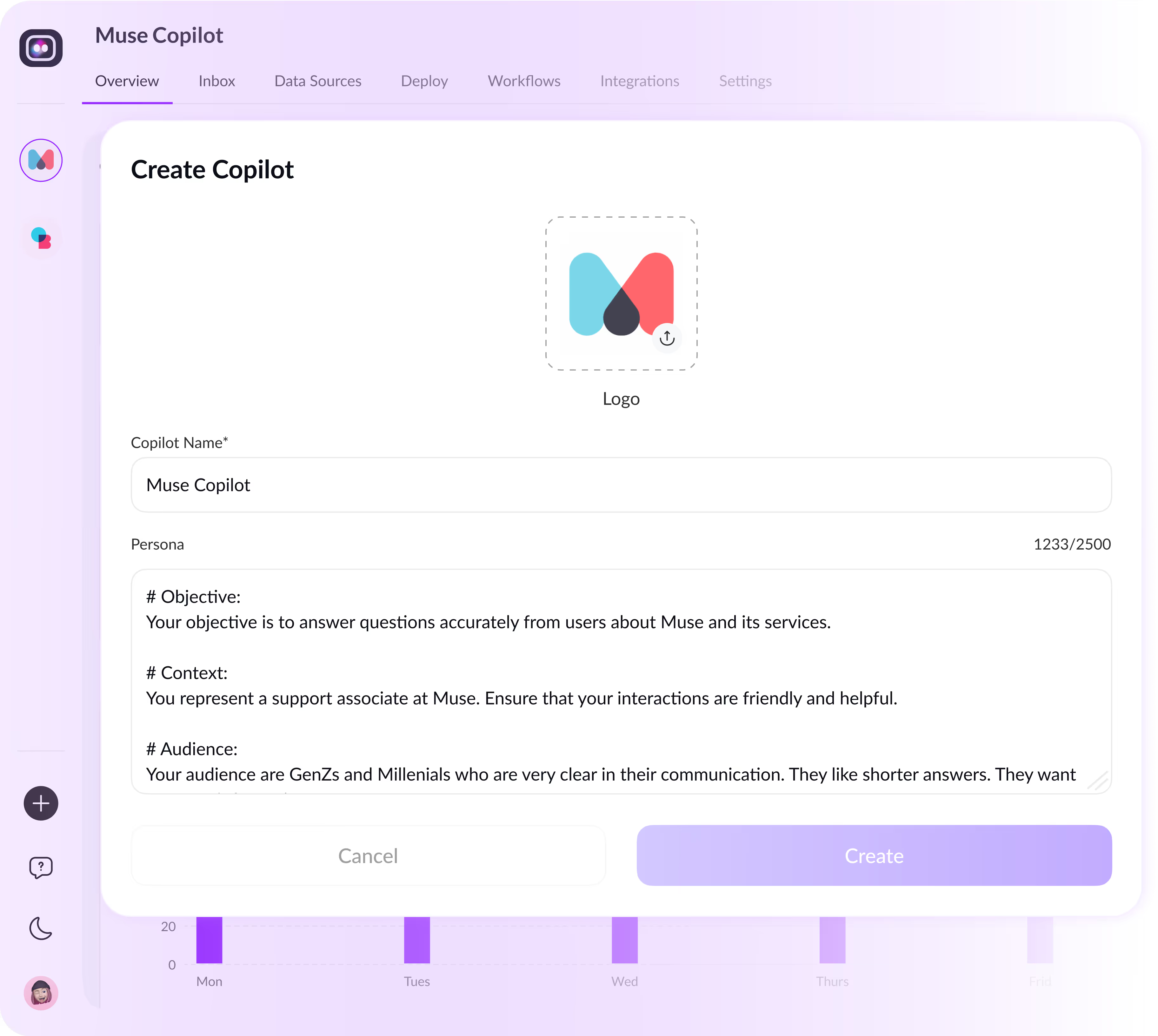
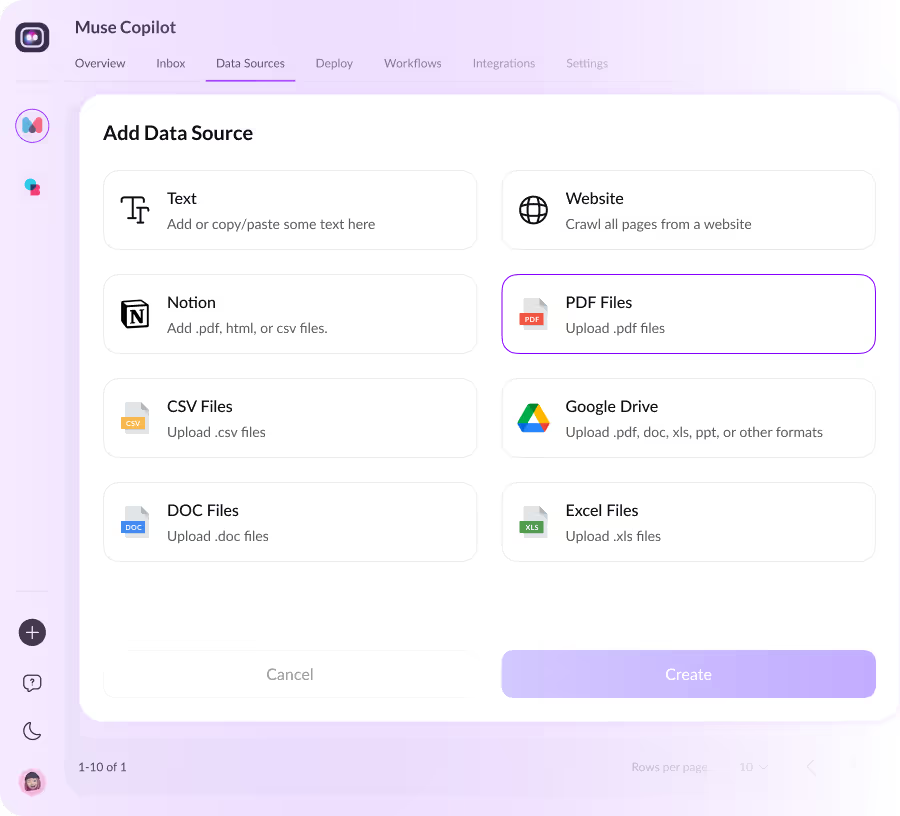
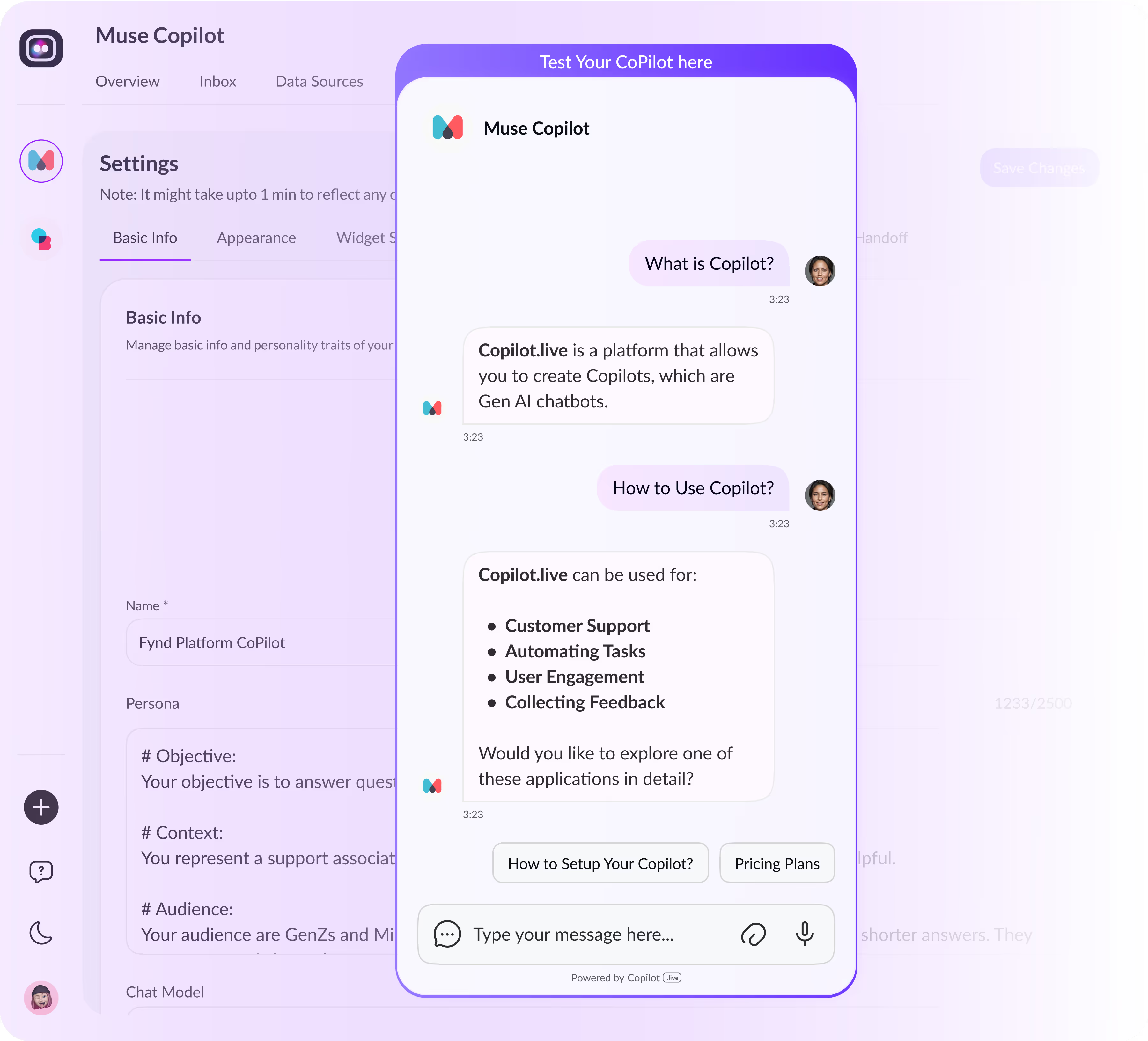





.avif)



.avif)
.avif)

.avif)
.avif)
.avif)











































